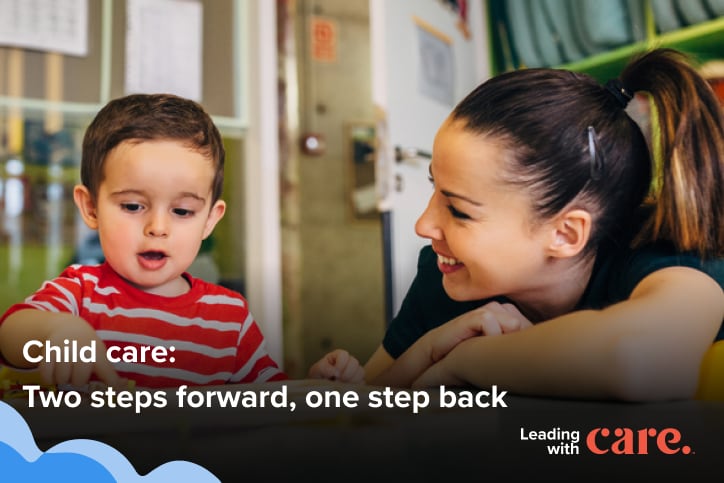June marked my first anniversary as CEO of Care. I was drawn to the Company and the role in no small part because I deeply believe in the impact care has and can have on all our lives. Over the course of the last year, that belief has only deepened as has my appreciation for the complexity that surrounds the topic of care.
Care is personal and also societal. It is about the family and also the economy. Care is comforting to have yet challenging to find. Care needs arise and can change at a moment’s notice, but solving our care crisis is moving at a snail’s pace.
Consider the everyday scenarios that can lead to a need for care: a sudden daycare closure and commensurate waitlists, a child home with a cold, or a grandparent unable to watch the kids for the night. When common occurrences like these take place, more than routines are upended. Our economy is as well, as parents miss work (sometimes a paycheck) and workplace productivity drops. And yet, despite the universality of these experiences and the scope of their impact at scale, Congress still has not prioritized child care investment and reform. In so many other ways, I look at the last 12 months and think “what a difference a year makes” but when it comes to fixing America’s child care crisis, I have to ask: “what difference did a year make?”.
Highs and lows
There have been some tangible victories including the CHIPs Act, President Biden’s Executive Order on Increasing Access to High-Quality Care and Supporting Caregivers, the proposed expansion to the Child Tax Credit, and a record-high percentage of working mothers with young children. However, we must acknowledge that some of these wins are fragile. The child tax credit legislation is far smaller than the levels we saw during the pandemic. And, despite passing with a strong vote through the House of Representatives, it remains stalled in the Senate.
The much celebrated return of women to the workforce at pre-pandemic levels could also be precarious. One of the low points of the last year was reaching the child care cliff and the lapse of pandemic-era child care funding in September. As the clock wound down, caregivers faced immense emotional distress as they awaited news about potential funding cuts and had to confront the prospect of losing their businesses while parents were equally anxious about where they would turn for care. The Biden administration’s attempt to revive this funding was commendable, but Congress failed to act. Just two months after the funding expired, we found that 40% of families were already feeling the impact by shelling out more money for care, with many expecting to spend an additional $7,000 this year due to the funding loss.
In past issues of this blog, we have highlighted those lawmakers who have been working diligently to introduce legislation intended to strengthen the child care sector and reduce costs for parents. To them, I want to say thank you and applaud their efforts. Unfortunately, these bills often get stuck in the introduction phase, and don’t make it to a vote so real policy action remains elusive.
Encouragingly, Secretary of Commerce Gina Raimondo, helped bring the conversation about accessible child care and workforce growth to the forefront through the first ever National Child Care Innovation Summit on June 27th. The event brought together key players, including Care.com, to talk about innovative solutions being implemented around the country, the critical importance of the involvement of employers in this conversation, and the need for forward thinking public-private collaboration to solve this crisis.
Parents, standing together, we can drive change
They say the squeaky wheel gets the grease. Well, we proved that last week. Alongside Moms First and several other for-profit and nonprofit organizations, we succeeded in getting a question asked about child care at the presidential debate. Unfortunately, we did not get the answers American families deserve.
But we will not be deterred, nor should you. We will continue our partnership efforts with groups like Moms First until we do get answers. We will share our efforts in ways you can get involved here in this blog. We will not let up. Too much is at stake and too much time has gone by with too little action. Ask yourselves if we can afford to wait much longer? I do not believe we can.






